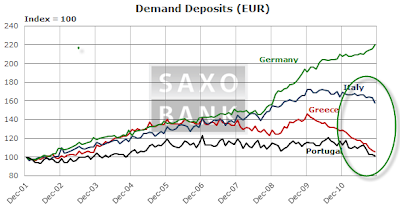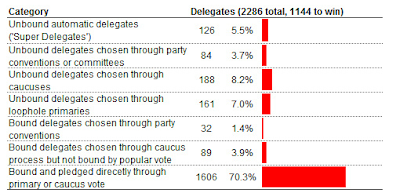Mish's Global Economic Trend Analysis |
- Gold Plunges Over $100; Some Blame Bernanke; What Did He Say? Nothing (However, I have 5 Different Interpretations of Nothing)
- Economy Grew 3.0% Annualized, Faster Than Expected in 4th Quarter; Or Did It?
- World Bank Warns of Economic Crisis in China; Only 3% Growth for Decade Says Michael Pettis
| Posted: 29 Feb 2012 06:06 PM PST It was a wild ride in gold today with a top to bottom over $100 as show in the following chart.  Some Blame Bernanke For "Committing to Nothing" Bloomberg reports Gold Falls in 'Manic' Plunge as Bernanke Damps Stimulus Bets Gold futures fell as much as $100 to below $1,700 an ounce on signs that that the Federal Reserve will refrain from offering more monetary stimulus to bolster the U.S. economy.Bernanke Hints at More QE In video commentary Fox News says Bernanke Hints at More Quantitative Easing Hints at More QE? Really? How about this interpretation? Door is Open, But Not For A While The Wall Street Journal reports Comex Gold Tumbles On Bernanke Testimony. "Bernanke's comments to Congress left the door open for more QE," said Steve Scacalossi, a director of precious metals with TD Securities, in a note. "But his statements that employment is recovering at a better than expected rate implies that if QE is coming, it won't be for a while."QE Increasingly Improbable The LA Times says Bernanke's testimony in Congress pushes down gold, silver prices Federal Reserve Chairman Ben S. Bernanke's words carried a great deal of weight in the commodity markets — so much so that they squashed the prices of gold and silver.Overall Dovish Undertones With Markedly Less-Dovish Testimony Yahoo! Finance reports Euro Tanks, U.S. Dollar Surges on Bernanke Testimony Federal Reserve Chairman Ben Bernanke was on Capitol Hill today testifying in front of the Committee on Financial Services. Despite overall dovish undertones, the chairman's testimony was markedly less-dovish than recent Federal Reserve communiqués, boosting the U.S. Dollar across the board.Bernanke's Actual Testimony Please consider Semiannual Monetary Policy Report to the Congress, Testimony by Ben Bernanke. A quick sscan shows Bernanke did not mention the word "quantitative" once. The Only reference to "easing" was in relation to constraints on motor vehicle parts in Japan related to the earthquake. Bernanke did say growth would be close to or somewhat above second half of last year but "fundamentals that support spending continue to be weak". More specifically the Fed forecasts "2.2 to 2.7 percent, considerably lower than the projections they made last June" He also said "housing affordability has increased dramatically" but "potential buyers lack the down payment ... others are reluctant to buy a house now because of concerns about their income" In regards to unemployment, Bernanke said "With output growth in 2012 projected to remain close to its longer-run trend, participants did not anticipate further substantial declines in the unemployment rate over the course of this year. Looking beyond this year, FOMC participants expect the unemployment rate to continue to edge down only slowly toward levels consistent with the Committee's statutory mandate." That's "markedly less dovish"? Really? What does that mean for QE? Nothing. That's what. People can and did read into Bernanke's testimony what they wanted to hear. Others judged the market reaction, and wrote a corresponding explanation to fit. One thing's for certain, that was hardly an upbeat assessment of the economy especially in light of the statement that "global financial markets posed significant downside risks". Here's the deal. If the economy tanks the Fed is likely to do another round of QE. The same holds true for another LTRO by the ECB. By the way, a couple of the links above came via email from Pater Tenebrarum at the Acting Man Blog, who in turn got them from Lance Lewis. Thanks! Mike "Mish" Shedlock http://globaleconomicanalysis.blogspot.com Click Here To Scroll Thru My Recent Post List |
| Economy Grew 3.0% Annualized, Faster Than Expected in 4th Quarter; Or Did It? Posted: 29 Feb 2012 10:48 AM PST Reuters reports Economy grew faster than expected in fourth quarter Gross domestic product expanded at a 3 percent annual rate, the quickest pace since the second quarter of 2010, the Commerce Department said on Wednesday in its second estimate.GDP Price Indices The rise in income is nice but excluding the inventory correction, the rise in GDP was anemic. Moreover, please note Excel Spreadsheet Table 4.--Price Indexes for Gross Domestic Product and Related Measures: Percent Change From Preceding Period in the BEA's GDP Report.  My friend BC Writes Does anyone actually believe prices decelerated at a 70% quarterly annualized rate in Q4?Mike "Mish" Shedlock http://globaleconomicanalysis.blogspot.com Click Here To Scroll Thru My Recent Post List |
| World Bank Warns of Economic Crisis in China; Only 3% Growth for Decade Says Michael Pettis Posted: 29 Feb 2012 12:32 AM PST A World Bank report to be released next week warns of an economic crisis in China unless state-run firms are scaled back. The Wall Street Journal discusses the report in New Push for Reform in China An exclusive preview of an economic report on China, prepared by the World Bank and government insiders considered to have the ear of the nation's leaders, offers a surprising prescription: China could face an economic crisis unless it implements deep reforms, including scaling back its vast state-owned enterprises and making them operate more like commercial firms.China's Difficult Transition From an Unsustainable Growth Model Peak oil, a housing bubble, bad debts and over-reliance on investments with no genuine economic feasibility guarantee China's current boom is not sustainable. China bulls are in for a ride awakening when various bubbles pop. As for recommendations, the report proposes a sharp increase in the dividends that state companies pay their owner (the government) in order to boost revenue and pay for new social programs. Does China need to increase competition, break apart, and privatize the state-owned monopolies? Or should China simply increase the dividends? I vote for the former as does Michael Pettis at China Financial Markets. Via email, Pettis says: The report is good as far as it goes, but it doesn't go far enough. Of course increasing SOE dividends to the government for use in social programs will transfer wealth from the state sector to the household sector, but if the total profitability of the SOE sector is less than one-fifth to one-eighth of the direct and indirect subsidies transferred from the household sector, as I have argued many times, then even 100% dividends is not enough to slow the transfer significantly, and remember the transfers have to be reversed, not merely slowed. This proposal falls in the better-than-nothing category, but just.Sad State of Political Acceptability The report makes feeble recommendations to ensure the proposals are "politically correct". This is a bad practice for three reasons.
It would be far better list the alternatives and the limitations of those alternatives, then provide an honest assessment rather than assume something cannot be done. Unfortunately, telling people what they want and expect to hear is the sad state of political pandering everywhere. Mike "Mish" Shedlock http://globaleconomicanalysis.blogspot.com Click Here To Scroll Thru My Recent Post List |
| You are subscribed to email updates from Mish's Global Economic Trend Analysis To stop receiving these emails, you may unsubscribe now. | Email delivery powered by Google |
| Google Inc., 20 West Kinzie, Chicago IL USA 60610 | |


